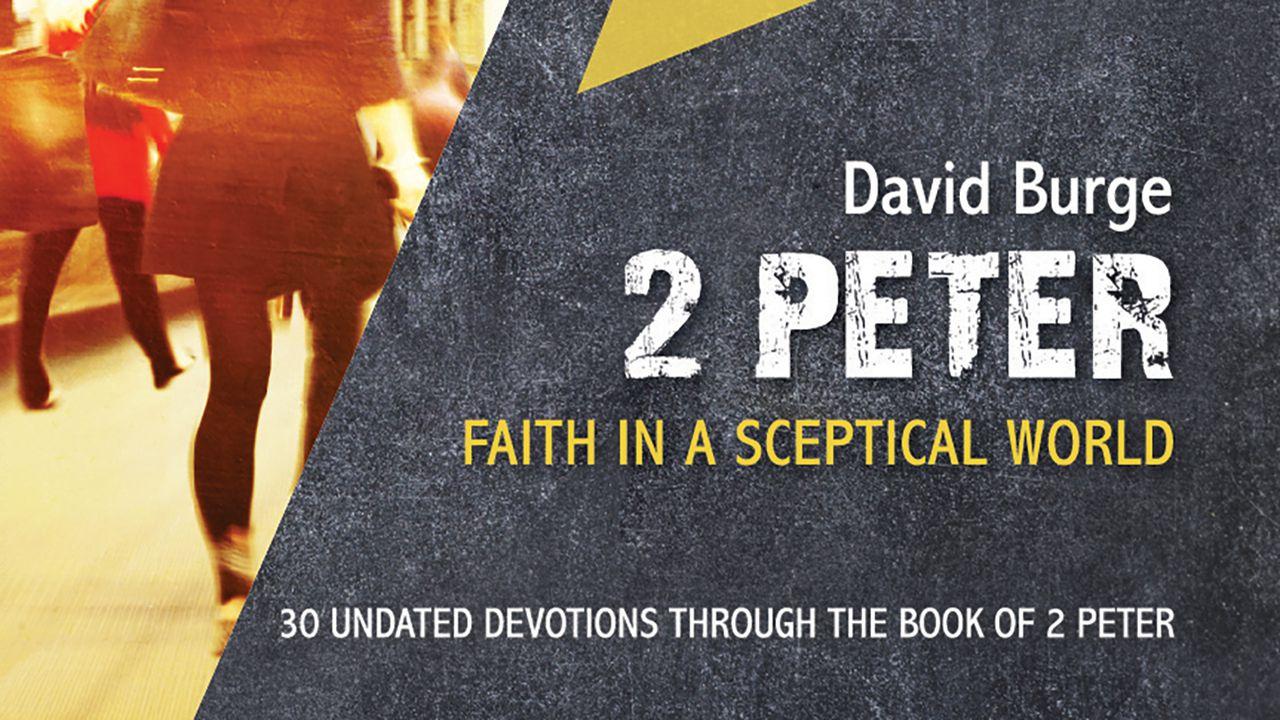2 Peter: Faith In A Skeptical World Sample

(focuses especially on v. 19)
In a world which is often sceptical about the truth of Christianity, do you ever wonder, ‘How do I know that the good news of Jesus is really true?’ It may be a comfort for you to know that God and His people have always faced doubters and mockers. Consider the opposition faced by Moses, the Prophets, Jesus, Stephen and many other Christians by the time Peter wrote this letter.
In an ever-skeptical world, it is important for us to be clear why we believe what we believe. Peter has already made clear the things he saw and heard; he and most of the Apostles were willing to die for maintaining their bold testimony. And yet, in verse 19, Peter says that our confidence in the truth of Christ need not rest alone on his eyewitness testimony. After all, what he and thousands of others saw and heard during the life of Jesus was simply, and wonderfully, fulfilling the Old Testament’s predictions.
That is, Peter might say, ‘You can be confident Jesus is “the real deal” not just because we say so, but because the Old Testament Scriptures similarly testify about Jesus.’ The more literal translation of verse 19 reads, ‘And we have the made-more-sure prophetic word.’ What does Peter mean by that? He means that while the Scriptures could also be trusted by previous generations, their trustworthiness has been wonderfully validated by the events the Apostles described. The events recorded in the New Testament give an indisputable ‘tick’ to the Old Testament’s prediction of them.
If, for example, we are reading Matthew’s Gospel using a Bible that has cross-references in the footnotes, we get a glimpse of how much of the Gospel’s events are fulfilling Old Testament prophecies. The New Testament affirms that the Old Testament was correct in its prophecy about Jesus, and the Old Testament helps us to see the foreknowledge of God as well as the significance of who Christ is – as presented by the New Testament. Each Testament is able to stand alone, but when the two are read together we see them powerfully validate, and help us to interpret, each other.
Peter is saying that we should listen to his eyewitness account of events as they happened, but we should also hear the voice of the made-more-sure Old Testament which testified to the very same things centuries before they occurred (v. 19). In this way Peter reminds us of three significant sources for our certainty – the Apostles’ eyewitness accounts; the Old Testament’s further validated testimony; and, in particular, the day when God’s people from both periods saw King Jesus transfigured and honoured by His Father in heaven.
The word of God is very intentionally self-validating. God left His fingerprints all over it for the humble astonishment of His people.
Reflection
To what extent have you sensed that God's word is majestically self-validating for those with eyes to see?
Scripture
About this Plan

Your faith is precious! So often, though, we can feel weak, irrelevant and marginalized. Living in a skeptical world where truth is twisted and false teaching abounds isn’t easy. Peter knew about the challenges of living in such a world, but he also knew Jesus deeply, and he was utterly convinced of the importance of trusting Jesus and living for Him. Bible teacher David Burge delves into this letter and highlights relevant applications for our lives today. Be reminded of the truth about Jesus, motivated to continue to trust him and equipped for living in a skeptical world with these thirty undated devotions.
More
Related plans

Name Above All

Celebrate

What Is the Fear of the Lord?

Mission Trip Checkup: On Mission

Becoming a Hero With Lisa Bevere

Adventure in Evangelism

Living in the Tension: A Study on the "Now and Not Yet" Kingdom of God

Healing Family Relationships Through Boundaries

Lift Others Up: 3 Days of Encouragement
